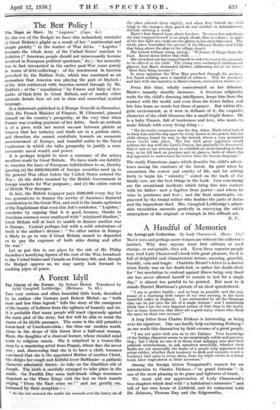A Forest Idyll
The Christ of the Forest. By- Robert Michel. Translated by Sybil Campbell Lethbridge. (Methuen. 7s. 6d.) This very curious and often beautiful little book, described by its author—the German poet Robert Michel—as " both more and less than legend," tells the story of the emergence of the beauty of holiness from the ugliness of insanity and sin. It is probable that many people will react vigorously against the main plot of the story, but few will be able to resist the charm of its idyllic passages. The scene is the still primitive forest-land of Czechoslovakia ; the time our modern world. Alone in the deeps of this forest lives a half-mad woman, Marie, the daughter of a charcoal burner, whose clouded mind tends to religious mania. She is surprised in a trance-like sleep by a wandering artist from Prague, whose face she never sees ; and, discovering that she is to have a child, becomes convinced that she is the appointed Mother of another Christ. She obliges her rough and faithful lover Balthasar—a pathetic character admirably drawn—to take on the thankless role of Joseph. The birth is carefully arranged to take place in the stable. On Twelfth Day some half-drunk village mummers disguised as the Three Kings visit the but on their rounds singing " From the East come we " and are greatly, ern.
barrassed by their reception - •
" As the trio entered the stable the warmth anti the heavy air of the place sobered them slightly, and when they beheld the child - lying in the manger,,they gazed at one another in astonishment,
without uttering a word. — - - - . Marie's hair floated loose about her face. To cover her nakedness she had wrapped herself in an ample shawl, blue in colour ; in spite of the dim light one could see the glitter in her steel-blue eyes. The whole place resembled the picture of the Blessed Mother and Child that hung above the altar in the village church. She bowed without rising, saying : Welcome, 0 Kings from the East. Kneel down before this child. . .
She stretched out her cupped hands in order to receive the presents to be offered to the child. The young men exchanged embarras zed -glances, but Marie demanded further, addressing one of the three: ' Dost thou bring incense ? ' In some agitation the Wise Man searched through his pockets, but found -nothing save a handful of tobacco. This he produced and laid with due humility in Marie's hands, extended to receive it."
From this time, wholly concentrated on her delusion, Marie's insanity steadily increases. A ferocious religiosity waits for the child's dawning intelligence, keeps him from the contact with the world, and even from his foster father, and lets him -learn no words but those of prayer. • But within thi grim environment, as it were in defiance of it,- the exquisite character of the child blossoms like a small bright flower. He is a baby Francis, full of tenderness and love, who wants to make friends with every living thing :—
" His favourite companion was the dog, Adam. Marie tried indeed to keep him and the dog apart by every means in her power, but the child always found his way to the kennel, where a very animated scene would take place. The boy with great eagerness would address the dog with the Lord's Prayer, but gradually ho discovered that it was no use attempting to establish an understanding in that way, so he fell back on gestures and on glances, both of which the dog appeared to understand far better than the human language."
The really Franciscan pages which describe the child's adven- tures among the creatures of the ' forest, his grief when he encounters the sorrow and cruelty of life, and his setting forth to begin his " ministry " seated on the back of the family cow, are the best things in the book. Less convincing are the sensational incidents which bring him' into contact with his father—now a fugitive from justice--and whom he wins to penitence and love ; and the final catastrophe, en- gineered by the brutal robber who doubles the parts of Judas and the impenitent thief. Mrs. Campbell Lethbridge's admir- able translation succeeds perfectly in conveying the subtle atmosphere of the original—a triumph in this difficult art.
E. U.


























































 Previous page
Previous page